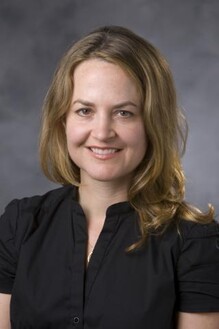PrEP HIV-Prevention Clinic Opens at Duke

HIV Educator Brian Goings
Duke's new PrEP clinic helps people at high risk for HIV take steps to prevent infection. Read answers to your questions about HIV PrEP.
What Is PrEP?
PrEP stands for pre-exposure prophylaxis. “It’s a way for people who are at higher risk for getting HIV to prevent infection before they come in contact with the virus,” said infectious disease specialist Dr. Mehri McKellar, MD, who directs the Duke PrEP clinic.
PrEP involves taking a pill every day. The pill combines two medications often used to treat HIV and is sold under the brand name Truvada. PrEP medication, when taken preventively, can keep the virus from taking hold in your body if you are exposed to it—for example, through unprotected sex or injection drug use.
How Effective Is PrEP Medication?
When people who are at high risk for HIV take PrEP medication consistently, it can reduce their risk of HIV infection by as much as 92%, according to the CDC.
Who Should Get PrEP?
PrEP is recommended for those who are HIV negative but are at very high risk of getting infected with HIV.
You may be at very high risk if you are a man who has sex with men or a heterosexual man or woman who:
- Uses condoms sometimes or not at all
- Has a sexual partner who is HIV-positive or multiple partners with unknown HIV status
- Has recently been diagnosed with a sexually transmitted disease (STD)
- Is a commercial sex worker
- Injects drugs intravenously
Brian Goings, a Duke PrEP clinic patient, had multiple reasons for seeking additional HIV prevention. As a self-identified queer male who is also an HIV educator, he said, “I like to practice what I preach.” And what he teaches his students is, “Even with condoms, you’re never 100% protected. So if I can have a backup to the backup plan, that’s perfect.” He’s also a phlebotomist—a health care professional who draws blood samples or donations from patients. “If I’m getting someone’s blood who does not know that they’re HIV positive, and I get an accidental needle stick, I’m covered that way as well.”
What If I’ve Already Been Exposed to the HIV Virus?
If you’ve had a one-time exposure -- for example, from an accidental needle stick or unprotected sex with an infected person -- seek treatment at an emergency room immediately. The ER doctor will likely prescribe anti-HIV medications for a month and recommend you get a follow-up HIV test. This is called post-exposure prophylaxis, or PEP. It’s different than PrEP. The treatment is only effective at preventing HIV infection if you start it within 72 hours of exposure.
What Else Do I Need to Know About PrEP?
PrEP medication only offers protection against HIV. If you’re taking it, you’ll still need to use condoms to protect yourself against other sexually transmitted diseases.

"If I can have a backup to the backup plan, that’s perfect."
What Happens at the PrEP Clinic?
When you come to the PrEP clinic, a health care professional will ask you about your HIV exposure and assess your risk. If you haven’t had an HIV antibody test within the past week, your blood will be drawn for a new test to confirm you’re not already infected. Your blood will also be tested to ensure your kidneys are functioning well. If you and the doctor agree that PrEP medication would be advisable in your circumstances, you’ll get a prescription.
But PrEP is more than just medication. Clinic staff also provide counseling to help you understand how to take the drug—if you don’t take it consistently, you won’t be protected—and learn about other ways to reduce your risk. They can also help you fill out financial assistance forms to get help paying for the tests and medication. They also provide follow-up visits and testing.
Can I Get PrEP Medication from My Primary Care Doctor?
“Yes, if your doctor has the knowledge and comfort level to prescribe PrEP,” said Dr. McKellar. “It varies from doctor to doctor. If your primary care doctor isn’t able to prescribe PrEP medication, our clinic is open to you.” Dr. McKellar’s team is in the process of training primary care doctors throughout Duke to prescribe PrEP.
Where and When Can I Go to the Duke PrEP Clinic?
The clinic sees PrEP patients from noon to 4:00 pm on Wednesdays in Duke Clinic 1K, 40 Medicine Circle, Durham. Call 919-620-5300 to schedule an appointment, or visit the PrEP clinic location page for more information.



